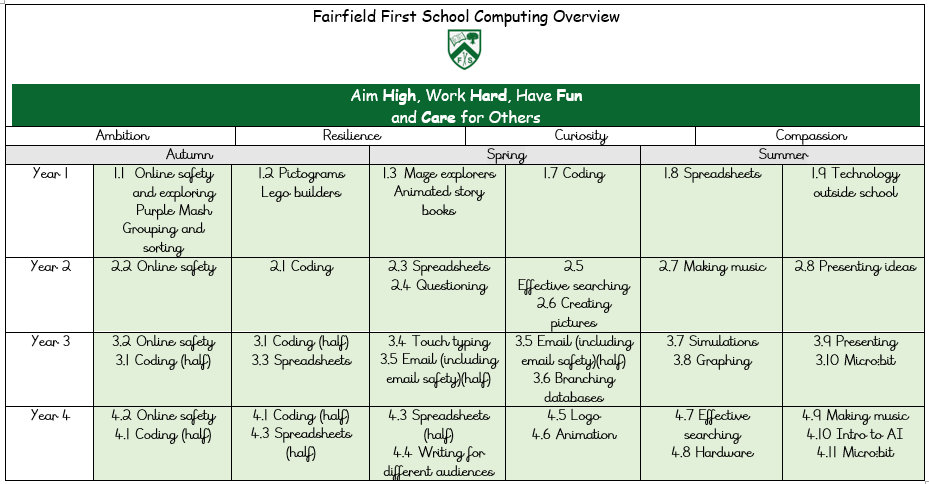Computing
Subject lead: Mrs Thurston
At Fairfield First School we understand the immense value technology plays not only in supporting the computing and whole school curriculum but overall in the day-to-day life of our school. We believe that technology can provide: enhanced collaborative learning opportunities; better engagement of pupils; easier access to rich content; support conceptual understanding of new concepts and can support the needs of all our pupils.

Our Aims
- Provide an exciting, rich, relevant and challenging Computing curriculum for all pupils.
- Teach pupils to become responsible, respectful and competent users of data, information and communication technology.
- Provide technology solutions for forging better home and school links.
- Enthuse and equip children with the capability to use technology throughout their lives.
- Teach pupils to understand the importance of governance and legislation regarding how information is used, stored, created, retrieved, shared and manipulated.
- Utilise computational thinking beyond the Computing curriculum.
- Give children access to a variety of high quality hardware, software and unplugged resources.
- Equip pupils with skills, strategies and knowledge that will enable them to reap the benefits of the online world, whilst being able to minimise risk to themselves or others.
- Instil critical thinking, reflective learning and a ‘can do’ attitude for all our pupils, particularly when engaging with technology and its associated resources.
- Use technology imaginatively and creatively to inspire and engage all pupils, as well as using it to be more efficient in the day-to-day running of a classroom and school
Online Safety
Online safety has a high profile at Fairfield for all stakeholders. We ensure this profile is maintained and that pupil needs are met by the following:
- A relevant up-to-date online safety curriculum which is progressive from Early Years to the end of Year 4.
- Through our home/school links and communication channels, parents are kept up to date with relevant online safety matters, policies and agreements. They know who to contact at school if they have concerns.
- Data policies which stipulate how we keep confidential information secure.
- A curriculum that is threaded throughout other curriculums and embedded in the day-to-day lives of our pupils.
- Pupils, staff and parents have Acceptable Use Policies which are signed and copies freely available.
- Training for staff and governors which is relevant to their needs and ultimately positively impacts on the pupils.
- Our online safety policy (part of our safeguarding policy) clearly states how monitoring of online safety is undertaken and any incidents/infringements to it are dealt with.
- Scheduled pupil voice sessions and learning walks steer changes and inform training needs.
- Filtering and monitoring systems for all our online access.
Curriculum
As a school, we have chosen the Purple Mash Computing Scheme of Work from Reception to Year 4. The scheme of work supports our teachers in delivering fun and engaging lessons which help to raise standards and allow all pupils to achieve to their full potential. We are confident that the scheme of work more than adequately meets the national vision for Computing. It provides immense flexibility, strong cross-curricular links and integrates perfectly with the 2Simple Computing Assessment Tool. Furthermore, it gives excellent supporting material for less confident teachers.
Each subject area have online resources, apps and computer hardware that they use regularly in their delivery.
Early Years
We aim to provide our pupils with a broad, play-based experience of Computing in a range of contexts. We believe the following:
- Recording devices can support children to develop their communication skills. This is especially useful for children who may have English as an additional language or specific speech and language needs.
- Early Years learning environments should feature ICT scenarios based on experience in the real world, such as in role play.
- Pupils gain confidence, control and language skills through opportunities to ‘paint’ on the interactive board/devices or control remotely operated toys.
- Outdoor exploration is an important aspect, supported by ICT toys such as metal detectors, controllable traffic lights and walkie-talkie sets.
Key Stage 1 outcomes
- Understand what algorithms are, how they are implemented as programs on digital devices, and that programs execute by following a sequence of instructions. - Write and test simple programs.
- Organise, store, manipulate and retrieve data in a range of digital formats.
- Communicate safely and respectfully online, keeping personal information private, and recognise common uses of information technology beyond school
Key Stage 2 outcomes
- Design and write programs that accomplish specific goals, including controlling or simulating physical systems; solve problems by decomposing them into smaller parts.
- Describe how Internet search engines find and store data; use search engines effectively; be discerning in evaluating digital content; respect individuals and intellectual property; use technology responsibly, securely and safely.
- Use sequence, selection and repetition in programs; work with variables and various forms of input and output; generate appropriate inputs and predicted outputs to test programs.
- Select, use and combine a variety of software (including internet services) on a range of digital devices to accomplish given goals, including collecting, analysing, evaluating and presenting data and information.
- Use logical reasoning to explain how a simple algorithm works and to detect and correct errors in algorithms and programs.
- Understand computer networks including the internet; how they can provide multiple services, such as the worldwide web; and the opportunities they offer for communication and collaboration

